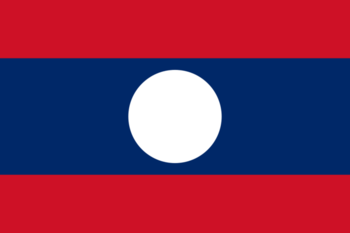Main Character Index Superpowers: Großgermanisches Reich (Heydrich's Germany) | The United States of America (1964-1968 American Presidents | 1972 American Presidents) | Dai-Nippon Teikoku Major Powers: Regno d'Italia | Iberian Union | Republic of Turkey | Ordensstaat Burgund Other Countries By Region: Africa: Northern & East Africa | West Africa | Southern Africa | Post-Colonial Central Africa Asia: Mainland China & Oceania (State of Guangdong | 1964-1972 Guangdong Chief Executives | Guangdong Flavor Characters) | Southeast Asia (Republic of Indonesia) | South Asia | Middle East | Central Asia Europe: Northern & Western Europe (British Isles | French State) | Southern Europe | Eastern Europe (Reichskommissariat Ukraine | Reichskommissariat Moskowien) Americas: North America | South America (United States of Brazil | Argentine Republic | Oriental Republic of Uruguay) The Russian Anarchy: West Russia (West Russian Revolutionary Front | Komi Republic | Communist Party of Komi | Passionariyy Organization | Taboritsky's Russia) | Southern Urals | Western Siberia | Central Siberia (Siberian Black Army) | The Far East (Harbin Three) | After Midnight Miscellaneous: Antarctica | Miscellaneous Content | Non-Canon Content
Indochinese Peninsula

- Authority in Name Only: Parts of Vietnam have fallen out of the puppet regime's control and are a hotbed of Viet Minh resistance activities.
- Government in Exile: If the Viet Minh successfully kicks out the Japanese collaborators, the latter will establish a new government-in-exile in Thailand.
- Long Game: With Japan's permission, Vietnam has been allowed to expand their military, in which they must carefully do so slowly to remain in their master's good graces, the optimal outcome in the long term.
- Lost in Translation: After the monarchy is abolished, the country's full English name changes from Empire of Vietnam (Đế quốc Việt Nam) to Republic of Vietnam, though officially Trương Tử Anh uses Việt Nam Dân quốc (in accordance with Phan Bội Châu's dreams) while Ngô Đình Diệm uses Việt Nam Cộng hoà (the same name he used in real life after deposing Bảo Đại) in Vietnamese, a distinction that doesn't exist in English (both the words dân quốc and cộng hoà were originally made up as translations for the French word république).
- Puppet State: While the Empire of Vietnam, which Japan set up after kicking out France, is officially independent, Vietnam has merely switched a European master for an Asian one. Japan continues to dominate the economy, military and internal politics; technically, the French Indochinese state apparatus has still not been officially abolished.
- La Résistance: The infamous Viet Minh lurk in the countryside of not just Vietnam, but all of Indochina. Through their efforts, they have been launching attacks against Vietnam's supply lines and grow stronger with each passing day.
- We ARE Struggling Together: The National Front of Vietnam is plagued with infighting, as factions constantly shift blame for their failures onto another. This division may prove to be their downfall, as the Viet Minh seeks to exploit this weakness.
Bảo Đại

- 0% Approval Rating: Bảo Đại's hedonism and apathy have caused the people and the political establishment to loathe him and call for the monarchy to be abolished. Unsurprisingly, most playthroughs involve the Vietnamese monarchy being abolished.
- The Emperor: Bảo Đại is the powerless emperor of Vietnam, soon to be swept away by the tides of change.
- The Hedonist: Described as a renowned luxuriant wastrel, Bảo Đại spends most of his days in luxurious idleness in his Imperial Citadel.
- Puppet King: Bảo Đại holds no power of his own, acting as a tool for Japan's purposes in Vietnam.
Vũ Ngọc Anh

- Short-Lived Leadership: Since Vũ Ngọc Anh only serves as caretaker Prime Minister following the resignation of Trần Văn Chương after the disastrous Operation Yon-Go, his government doesn't last long before he's forced to resign or overthrown. Even the newspaper to the event calls it short-lived.
- You Are in Command Now: Vũ Ngọc Anh was thrust into power unexpectedly after the failure of Operation Yon-Go.
Trương Tử Anh

- Politically Incorrect Villain: Trương Tử Anh's personal ideological theory is Survival Nationalism, which is partially inspired by eugenics theory and claims that certain people are stronger than others, thanks to certain natural instincts.
- The Quisling: Trương Tử Anh leads the National Front, one of the largest political organizations in Vietnam that advocates collaboration with Japan.
- The Unfettered: Once in power, Trương Tử Anh will promote his survival nationalism to the Vietnamese people with no regard to the cost or consequences of doing so.
Ngô Đình Diệm

- Allohistorical Allusion: Diệm's rise to power parallels his actions in real life, only with him currying favor with Japan rather than the United States.
- Closest Thing We Got: The Japanese are willing to tolerate Diệm's antics, should he assume power, viewing him as the only viable asset they have in the region. Even then, however, it's implied that they're not particularly enthusiastic about supporting him.
- Emergency Authority: Declaring a state of emergency once he takes power, Diệm uses the opportunity to consolidate his power and to enact his agenda of order and justice.
- The Fundamentalist: Under the idea of Oriental Personalism, Ngô Đình Diệm pushes for a social revolution based on Catholic doctrine, with many fearing that he'll begin persecuting those of different religions.
- Long Game: Diệm has spent ten years slowly building up his power so he can attain the role of Prime Minister and ingrain his ideals of Personalism and the Social Revolution into Vietnam.
- Visionary Villain: Ngô Đình Diệm advocates for a Social Revolution to both sweep away material capitalism and the Viet Minh, revitalize Vietnam and restore order and justice.
- Word Salad Philosophy: Diệm advocates for "Oriental Personalism", a strange ideology rooted in Catholic philosophy (specifically, the writings of theologian Emmanuel Mounier) calling for a social revolution that will sweep away the Việt Minh's advocated communist revolution.
Nguyễn Phúc Minh Đức

- Blatant Lies: During his coup, Minh Đức orders the military to occupy Thuận Hoá under the guise of keeping order. Almost nobody buys the excuse and all are left wondering what his true motives are.
- But Not Too Foreign: Minh Đức is half-French, a fact used by the Viet Minh to accuse him of being a French infiltrator.
- Dark Horse Victory: Given the Royalists' minimal influence, Minh Đức is the least expected to take over Vietnam after Vu Ngoc Anh's downfall.
- Royals Who Actually Do Something: Minh Đức is the only son of the late Emperor Hàm Nghi and the main representative of Vietnam's vestigial monarchist cliques.
Nguyễn Khánh

- Military Coup: If Operation Yon-go fails against the Viet Minh, Khánh will mobilize a military coup against the government, establishing a National Military Council, with himself as its indefinite head.
- Red Scare: He is motivated by fear of the Viet Minh, whose territorial gains may drive him to launch a coup to take matters in his own hands.

- Determinator: The Viet Minh has been fighting for decades and remains one of the largest and most persistent resistance movements left within the Co-Prosperity Sphere.
- La Résistance: The Viet Minh or National Liberation Front, a rigorously-trained guerrilla army led by Hồ Chí Minh, fight against the pro-Japanese regime in Vietnam and wage a large-scale guerrilla war in the countryside.
Hồ Chí Minh

- Allohistorical Allusion: Just as he fought a guerrilla campaign against the French and Americans for Vietnam's independence in OTL, Ho Chi Minh has initiated a similar war in this timeline, but rather against the Japanese and their collaborationist government instead.
- Chummy Commies: His guerrillas seek to kick the Japanese out of Vietnam and restore independence for their country.
- Occupiers Out of Our Country: Hồ Chí Minh and his Vietcong seek to secure Vietnam's independence from Japan.
- Rebel Leader: Just like in real life, Hồ Chí Minh leads the Viet Minh in their struggle for independence.
- Short-Lived Leadership: While he had been leading the Viet Minh since World War II, Hồ Chí Minh dies of heart failure soon after becoming the first President of Vietnam.
Trường Chinh

A devoted follower of Minh and fellow socialist freedom fighter, Trường Chinh serves as his second-in-command and a possible successor as leader of the Vietcong. Taking his current name from the famed Long March in honor of the late Mao Zedong, Chinh vows to implement land reform inspired by Mao's own writings combined with his own interpretation of anti-colonialism.
- Allohistorical Allusion: Trường Chinh's reformist policies are based on his real life rule over Vietnam in the 1980s, albeit applied much earlier than OTL due to being made Minh's immediate successor.
- Chummy Commies: Trường Chinh is a renowned revolutionary hero and is just as eager to liberate Vietnam as Minh.
- Internal Reformist: After assuming control, he proceeds to institute pragmatic reforms to ensure Socialism's long-term survival in Vietnam.
- Taking Up the Mantle:
- His adopted name, which means "Long March" in Vietnamese, was adopted to honor the Long March undertaken by the Chinese martyr, Mao Zedong.
- Upon Minh's passing after winning Vietnam's independence, Trường Chinh takes leadership of the newly freed nation, determined to carry on his predecessor's legacy by implementing land reforms.
Võ Nguyên Giáp

The current Interior Minister of the Viet Minh and one of Hồ Chí Minh's most trusted generals. Giap is feared by the Japanese-backed government for his unmatched battlefield genius and transformation of the ragtag rebel militias into an effective fighting force that can go toe-to-toe with whatever army the monarchy throws at them.
- The Dreaded: For the Japanese-backed regime, he's feared for both his battlefield genius and an uncanny ability to turn ragtag militias into a lethal fighting force.
- Number Two: Giap is considered as one of Hồ Chí Minh's most trusted military commanders.
- Old Soldier: He's been fighting alongside Hồ Chí Minh for decades by the game's start date, having fought the French, Japanese, and monarchist forces over the course of his military career.
- Wrong Line of Work: Subverted. Giáp had no prior military training and originally sought to be a lawyer. Thanks to his tenacity and a life-long fascination with Napoleon Bonaparte and T.E. Lawrence's works, however, he quickly rose through the ranks to become one of the most feared men in the Viet Minh.

- Blatant Lies: The Lao government calls the Opium War an "anti-bandit campaign", but nobody buys this narrative, knowing that the RLA is just out to destroy rival cartels in Burma that are threatening their own opium trade.
- Properly Paranoid: The monarchists and conservatives accuse Souphanouvong of being a communist spy, which aren't taken seriously by Japan. These accusations are later vindicated when the Viet Minh liberate Vietnam and he reveals himself as an ICP member.
- Puppet State: Laos is nominally independent, but they are so dependent on Japan for economic and political stability, that they are essentially treated as a puppet to them.
- Teeth-Clenched Teamwork: Despite its small size, Laos is divided along political and regional lines, which the government will need to manage so that the nation isn't torn apart.
Sisavang Vatthana

Kou Abhay

The current Prime Minister of Laos since 1959, Kou Abhay is a noble-born general who was picked as Prime Minister by his controversial predecessor Phoumi Nosavan as part of a compromise. Largely considered a caretaker Prime Minister who will be replaced by somebody more assertive or capable in the next election, the elderly Abhay himself wishes to retire from political life and is content with his uneventful place in Laos' history.
- Contempt Crossfire: Abhay's biggest flaw is that he's too compromising. No one has any strong feelings, positive or negative, towards him, but this has left him with few allies and he's largely seen as a caretaker, until someone more suited to the premiership can take over.
- We Hardly Knew Ye: All Abhay wants is to retire from politics for good, where he gets his wish in the election year of 1962.
Souvanna Phouma

The Vice Prime Minister of Laos and brother to the popular Prince Phetsarath Rattanavongsa, Souvanna Phouma is determined to live up to his brother's legacy and make sure that the Laotian nation will survive any future turmoil it will encounter.
- Enemy Mine:
- To secure the 1962 election, Phouma can ally himself with the National Union Party, led by Bong Souvannavong. Though his partner opposes his liberal, Japanophilic stance, Phouma hates the conservatives even more and will lap up any support to counter them.
- Phouma can enter another coalition with Bong and his party because their progressive economic views and conservative social values will compromise and appeal to most.
- Alternatively, Phouma can start a coalition with Sananikone's party. Despite their opposing political stances, it can be necessary to stabilize the new administration and make them compromise on their most conservative policies.
- My Country, Right or Wrong: To Phouma, there is nothing more important than preserving Laos' survival.
- Taking Up the Mantle: Phouma admires his predecessor and brother, Phetsarath Ratanavongsa, for his ability to mediate the internal conflicts in Laos. With Ratanavongsa's passing, Phouma's determined to live up to his legacy.
Souphanouvong

Half-brother to princes Phetsarath Rattanavongsa and Souvanna Phouma, Souphanouvong is known as "the Red Prince" for his popularity with the peasantry and barely concealed left-wing sympathies. Unpopular with the monarchists and conservatives alike who denounce him as a communist spy, Souphanouvong nonetheless seeks to win the upcoming 1962 election and become Prime Minister.
- Kill the Creditor: Downplayed. After the Việt Minh liberates Vietnam from Japanese rule, Souphanouvong continues their work in Laos—though Laos is obviously not strong enough to take on Japan without allies, his former overlords in Tokyo are furious at the loans that Souphanouvong took and will never repay.
- Long Game: Knowing that Laos, undeveloped and surrounded by Japanese allies and puppets, is not ready for a revolution, Souphanouvong is willing to bide his time for years, feigning allegiance to pan-Asianism and pretending to see the Sphere as the greatest chance to develop Laos' industry. His bio after he reveals his true colours and joins forces with Vietnam describes him as the 20th century's greatest Trojan horse.
- Mole in Charge: Known for his left-wing views, Prince Souphanouvong has been a secret ally of the Indochinese Communist Party since 1949, something that does not prevent him from running and winning the 1962 election. As Prime Minister of Laos, he outwardly promotes ties with Japan, only to reveal his true colours when the Viet Minh liberates Vietnam, leaving Japan shocked and furious at the loans that he will never pay back.
- Realpolitik: While Souphanouvong is a communist and has no love for Japan, he's willing to keep the monarchy around and remain in the Co-Prosperity Sphere out of simple pragmatism until Vietnam's revolution succeeds, providing communist Laos with an ally.
- Red Baron: Souphanouvong is the Red Prince, the living contradiction of a communist royal, who will gladly hold the knife, slit the monarchy's throat and use its blood to water the people's farms and the nation's gardens.
Phoui Sananikone

The forebearer of the Sananikone noble dynasty whose reputation was tarnished with his brother’s collaboration with the Thai during Issara, Phoui Sananikone has spent the last ten years desperately trying to rebuild his family’s standing in Laos. Now serving as the voice of the conservatives, moderate aristocrats and monarchists, Sananikone’s corruption has led to him forging ties with the political elite and Laotian military. With a win in the 1962 election, perhaps Sananikone can finally redeem himself and his family in the eyes of the public.
- Corrupt Politician: Everyone knows of Phoui Sananikone's deep corruption. With his extensive ties in the elite and the military, he is not shy about using them for his own gain.
- The Friend Nobody Likes: His extremely conservative views on expanding the monarchy and reversing liberal policies have made him despised by the center and the left. Even Japan is uneasy about having him as an international partner.
Phoumi Nosavan

Phoumi Nosavan is Laos' current Minister of Defence and two-time attempted coup plotter of the Laotian government during Operation Issara. Formerly commanding the collaborator forces against the CGFL, Nosavan has now built up a loyal support base within the Royal Armed Forces following his return to the RLA. Needless to say, another coup attempt from Nosavan is inevitable- but when it will happen is another question entirely.
- Chronic Backstabbing Disorder: Nosavan has attempted two separate coups against the Laotian government in Operation Issara and he can bump his number up to three after the Opium War.
- Fascist, but Inefficient: His coup against the Lao democracy makes him extremely unpopular, with many forming pro-democracy militias to destabilize his regime. Many observers wonder how long Nosavan can last under these conditions.
- Gratuitous French: Nosavan's political party is called the "Forces Armées du Royaume" (Royal Armed Forces) despite the fact that French rule has ended in Laos and French is no longer the administrative language of Laos.
- Military Coup: If the Opium War is won, Nosavan will launch a Royal Army coup. If it succeeds, he gets commended by the ruling king, Sisavang Vatthana, for fighting against "the decadent liberalism of Phetsarath and his successors".
- Screw This, I'm Outta Here: If his coup attempt fails, Nosavan will flee the country, never to return.
Amkha Soukhavong

- Cincinnatus: Soukhavong only intends to be an interim Prime Minister, until free elections can be reestablished and someone more fitting for the job can take over.
- History Repeats: Soukhavong can end up defeating another coup attempt by Nosavan in Xam Neua. His own biography lampshades this fact.
- Humble Hero: After successfully thwarting a coup by Nosavan, Soukhavong could've easily landed himself in a good political career, but he turned this opportunity down to continue being a general, believing that he should stay away from politics.
- Reluctant Ruler: After foiling a second coup attempt, Soukhavong is named Prime Minister to transition Laos back to democracy. He accepts the mission, even though he resents his new job.
- War Hero: Soukhavong earned a lot of repute for defending Xam Neua from one of Nosavan's past coups, which helped turn the tide in favor of the CGFL.
Boun Oum Na Champassak

- Dragon-in-Chief: If Vong Savang is chosen as the new king after the Royal Army coup fails, Boun Oum still isn't any less capable. He's supposed to be Prime Minister and subordinate to Vong, but the political inexperience of the monarch means Boun Oum can easily manipulate him and freely return Laos to a royalist system.
- How the Mighty Have Fallen: He used to be King of Champassak, until Operation Issara destroyed much of his power and the throne was handed to Sisavang Vatthana. Meanwhile, Boun Oum was cast aside, only to ever be respected by the royalists, which has left him very bitter.
Somsanith Vongkotrattana

- Punch-Clock Villain: During Operation Issara, Vongkotrattana was forced to become head of the secret police, a position he never wanted and fortunately didn't remain long in, until he was replaced by one of Nosavan's minions.
- Puppet King: Vongkotrattana has never held real power in his life. He was ordered around by Nosavan during Operation Issara and he serves as a powerless rubber-stamp Prime Minister for King Boun Oum.
Bong Souvannavong

- Word Salad Philosophy: Bong Souvannavong is one of the most ideologically incoherent people in Laos—to the point that the unique Buddhist Socialism subideology was created for him. His ideal government is a fusion of monarchism, democracy, conservatism, Buddhist moralism, utopian socialism and anti-communism, holding right-wing social views and left-wing economic views. Despite this, he's still a shrewd politician with enough connections to potentially become Prime Minister.
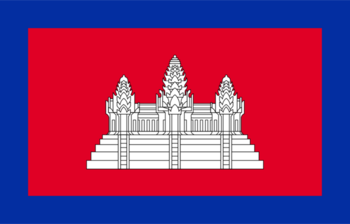
- Fascist, but Inefficient: Sihanouk's anti-democratic and repressive measures have fueled widespread insurrections across Cambodia, requiring a massive amount of funding to the armed forces to counter the ICP and Khmer Serei rebels. Lon Nol isn't much better either, having to rely on not only the armed forces but request Japanese troops to suppress rebellion.
- Puppet State: After the Japanese invasion of Indochina, they "freed" Kampuchea from their former French overlords, only to establish their own Japanese-aligned government in its place and effectively turning the country into a puppet state.
Norodom Sihanouk

- Clashing Cousins: A prominent political opponent of King Sihanouk is Sisowath Sirik Matak, himself a member of the royal family.
- Cincinnatus: Subverted. He shocked everyone when he stepped down the throne in 1955, claiming that he wants to avoid the "intrigues" of palace life. However, this was actually a strategic move for him to enter civilian politics and become one of Kampuchea's most influential figures, brutally quashing any opposition.
- Et Tu, Brute?: If the Tokyo Plot is foiled, Sihanouk will be left shocked that his close allies, including In Tam and Lon Nol, would betray him. This kicks off his downward spiral into worsening totalitarianism.
- The Purge: After uncovering a conspiracy to remove him from power in the Tokyo Plot, Sihanouk conducts a series of mass purges to eliminate perceived enemies hiding in the shadows.
- The Quisling: King Sihanouk has ruled Cambodia since 1941, submitting to the French, and now the Japanese, to keep his power.
- Well-Intentioned Extremist: If the Tokyo Plot fails, Sihanouk resorts to even more autocratic methods because he sees himself as the only person capable of keeping Cambodia safe from internal rebellion.
- Young and in Charge: After King Monivong's passing, Sihanouk was ascended to the throne when he was only ninteteen years old, right before the Japanese conquered Southeast Asia.
Lon Nol

- Chronic Backstabbing Disorder: Disatisfied with his reign, Lon Nol will try to betray Sihanouk while he visits Japan. Even if his attempt fails and he loses his influence, Lon Nol still tries again during the Oil Crisis, mobilizing the Tokyo Plot.
- Les Collaborateurs: When the French were still in control of Cambodia, Lon Nol served them in the military, helping them suppress independence movements. Unsurprisingly, he's adopted the same approach with the now-ruling Japanese, becoming Supreme Commander of the army in the process.
- Military Coup:
- Believing Sihanouk is incompetent and leading the nation astray from its traditional values, Lon Nol organizes the Tokyo Plot to depose him, uniting the Cambodian National Assembly, the Cambodian Army, and the Japanese Envoys behind this shared goal.
- While Sihanouk visits Japan to request more aid, Lon Nol can take over Cambodia for himself, which goes largely bloodless, but puts the government in a state of limbo between the monarchy and the military.
- Opportunistic Bastard: With protests ongoing in Phnom Penh and the Yasuda Crisis still crippling the economy, Sihanouk pays a visit to Tokyo to ask for more developmental aid. Lon Nol can easily exploit the power vacuum to overthrow him and seize control of Cambodia.
- Pyrrhic Victory: Even if he manages to overthrow Sihanouk, Lon Nol is left with the difficult task of repressing the riots and resistance movements that his predecessor has long struggled with. This can end up causing his downfall if Phnom Penh gets captured by the ICP's Cambodian section.
Tou Samouth

- Chummy Commies: Samouth is a member of the KBBK, dedicated to overthrowing Lon Nol's junta and install a democratic system in its place.
- Rebel Leader: After being forced into exile by Thai soldiers and taken in by the Viet Minh, Samouth began a Marxist insurgency cell, allied with Sơn Ngọc Minh and the Indochinese Communist Party to liberate Cambodia.
Sơn Ngọc Thành

- Cincinnatus: If he decides to hold elections, Thành will simultaneously promise to step down from power to let whoever wins take his place. However, it can also be subverted if the communists liberate Vietnam, provoking the fervently anti-communist Thành to declare a state of emergency and suspend the democratic process. He publicly claims that this is just a temporary measure until the situation in Cambodia stabilizes, but many cast doubt on this claim.
- Emergency Authority: If the Viet Minh liberates Vietnam, Thành declares a state of emergency in the Khmer Republic in response to what Phnom Penh describes as 'Communist agitation against our free nation'. Elections are suspended and freedom of speech, movement and assembly are curtailed. Thành claims this is only a temporary measure until the stabilisation of Cambodia's political situation, and that the restoration of democracy is on the horizon once the troubles plaguing Cambodia are resolved.
- Full-Circle Revolution: His coup against Lon Nol can end up changing little if he refuses to set up elections. In essence, Thành builds yet another autocratic regime where the people's liberties are trampled on and the armed forces quash dissent, allegedly supported by Thailand.
- Red Baron: Thành, the Two-Decade Revolutionary, leader of the nationalist and anti-monarchist Khmer Serei militia, is the Kingdom of Kampuchea's most hated man.
- Red Scare: Thành is dedicated to defending the Khmer Republic against communism, which he sees as its greatest threat, by any means necessary.
Tropes pertaining to the rework
- Hero-Worshipper: As mentioned in the Kampuchea rework teaser, Thành bases his ideology and governance on Sdech Kan, a brave soldier who once overthrow a cruel king and ushered in a prosperous age with his heroics. In his own story, Thành views himself as Kan and the House of Norodom as the king that he needed to depose. Unfortunately, his own iron fist shows that this was not necessarily for the better.
- Let No Crisis Go to Waste: A Khmer nationalist and sympathizer to Japanese styles of governance, Thành despised the Kingdom propped up by the French. When he became Prime Minister in 1949 and the country was destabilized by Operation Issara in the Kampuchea rework teaser, Thành toppled the unpopular monarchy and proclaim a nationalist republic.
- Necessarily Evil: Thành recognizes the petty brutality of his Director of National Security, Dap Chhuon, as shown in the Kampuchea rework teaser. However, Thành sees his position as a necessity to maintain order, even if he barely shows up to cabinet meetings.
- Villain with Good Publicity: In the Kampuchea rework teaser, Thành has widespread public support as a modernizer who toppled the unpopular monarchy, even if there is a growing opposition movement who have withstood his attempts to suppress them.
- Well-Intentioned Extremist: In the Kampuchea rework teaser, Thành believes that he's ushering in a better future for Kampuchea, though it means oppressing the many moderate and leftist voices who call out his autocratic actions.
In Tam

- Good Old Ways: In Tam revives the Krom Pracheathibateyy's name to signify a return to Cambodia's traditions before the Sangkum.
- Humble Hero: He has ambitious democratic ideals, but he doesn't openly advertise this because he's too modest to do so.
- Incorruptible Pure Pureness: Despite all the hardships he's faced and seen Cambodia undergone, he refuses to give up on his optimism and faith in a democratic Cambodia.
Sisowath Sirik Matak

- Blue Blood: Sirik Matak is the great-grandson of King Sisowath, a figure many were surprised to even find in the first place.
- Clashing Cousins: Sirik Matak, himself a member of the royal family, has long been a political opponent of King Sihanouk.
- Red Scare: Upon being elected, he promises to continue many of Thành's anti-communist measures.
- Royals Who Actually Do Something: Sirik Matak has stood opposed to the dictatorial regimes of Sihanouk and Lon Nol, joining forces with the Khmer Serei to depose the latter's junta.
"The Setting Sun" Update
- The Coup: In the Kampuchea rework teaser, Thành seized power and deposed the king to create the Republic of Kampuchea in a coup.
- Crapsaccharine World: Phnom Penh is a major economic hub in Southeast Asia, drawing significant tourism and business. Much of the city’s architecture was a product of the French colonial era and currently serves as the "Jewel of the Republic" in the Kampuchea rework teaser. However, the city also suffers from widespread gambling and prostitution, facilitating increasingly strong cries to resolve them.
- Divine Right of Kings: Devarāja, or kingliness, is a religious belief legitimizing the monarch as a god-king who deserves to rule. The Kampuchea rework teaser shows that the House of Norodom exploited this belief to rule lazily. This ended up undermining them when Thành took matters in his own hands and overthrew them, who now claims Devarāja for himself.
- Historical Villain Downgrade: Pol Pot, one of Cambodia's most infamous dictators in OTL, is reduced to irrelevance in TNO due to the German victory in this timeline, and makes only a minor appearance in one of the paths Kampuchea can take.
- Magikarp Power: By 1962 in the Kampuchea rework teaser, the Cambodian government is in the process of enacting the first Five-Year Plan to develop the country, spearheaded by Ieu Koeus and Son Sann. The plan seeks a total agricultural reform, land redistribution, and implementation of light mechanized industry in Kampt and Takeo. The plan is ambitious and will depend on a high cost of Japanese funding, management, and technical skills. However, if the plan pays off, Kampuchea will reap great rewards and have model provinces for the rest of the country to follow.
- Patriotic Fervor: The Kampuchean rework teaser shows that Thành relies on chauvinism and ethnonationalism to drum up popular support.
- Puppet State: As explained in a teased national spirit, Kampuchea was formed out of Thailand and is effectively under their whims, after they lost Battambang and Siem Reap from World War II and underwent Operation Issara. Fortunately for them, Thailand is mostly apathetic to Kampuchea's affairs.
- Teeth-Clenched Teamwork: Cambodia is a member of the CPS, alongside Thailand and Vietnam, but that doesn't mean Kampuchea's citizens are friendly to them, as shown in the Kampuchea rework teaser. If these tensions ever saw a resurgence or the rights of the Khmer people are not satiated, Southeast Asia may explode into conflict:
- For Thailand, many leftists have not forgotten the territory taken by Thailand during the Franco-Thai war, demanding their return.
- For Vietnam, both governments maintain formally cordial relations, especially to keep the Vietnamese minority in Kampuchea content. However, many Khmer citizens want to reclaim their eighteenth-century borders, which means taking Vietnam's control over the Mekong Delta.
Ieu Koeus

- Hypercompetent Sidekick: His teased biography calls him the brainchild behind Thành's regime, a respected National Assembly politician during Sihanouk's reign, and an elder statesman who negotiated the end of Issara. Thus, his reputation soars beyond even that of Thành's in certain circles. By 1962, Koeus is busy working on the Five-Year Plan, alongside Minister of Finance Son Sann, which would be a crowning achievement for himself and Kampuchea.
Achar Sok
- Internal Reformist: As mentioned in his teased biography, Sok was a monk who joined the KRPA regime to reform it and adopt a more charitable hand to the poor. His concern borders on being socialist.
- Richard Nixon, the Used Car Salesman: In OTL, he is most remembered for being one of the two founders of the Kampuchean People's Revolutionary Party and mentoring Saloth Sar, who is known more infamously by his later name, Pol Pot. In this timeline, the victory of Japan in World War II led Sok to join the KRPA regime instead, albeit still sympathetic to socialism and ideas of wealth redistribution, as shown in the Kampuchea rework teaser.
- Teeth-Clenched Teamwork: Japan is very tense about working with Sok. As shown in the Kampuchea rework teaser, Sok is audacious enough to suggest redistributing wealth to the poor and adopting a more independent foreign policy, akin to Indonesia and Azad Hind, all of which contradicts with Japan's own interests.
Son Sann

- Hypercompetent Sidekick: His role in the Thành regime is vital. As shown in the Kampuchea rework teaser, Sann is the country's link to Japan, mobilizing the capital needed to fulfill the five-year plan and the country's reconstruction from Operation Issara; without him, Thành couldn't accomplish any of these things.
- Taught by Experience: His teased biography mentions that Sann has grown up around wealth all his life, being the son of a wealthy landowner and earning a degree from the Hautes Études Commerciales. This made him a perfect civil servant in the Issara and bureaucrat in Thành's cabinet.
Dap Chhuon

- Absentee Club Member: According to the Kampuchea rework teaser, Chhuon is nominally the Director of National Security, but he rarely attends any cabinet meetings, primarily too busy engaging in warlordism around the Tonlé Sap.
- Insane Admiral: Violence is a first resort for Chhuon, as stated in the Kampuchea rework teaser. Thành can always rely on him to brutally quash all dissent.
- King of Thieves: Though he was an anti-French rebel leader in the Franco-Thai War, Chhuon eventually descended into a petty warlord infamous for his brutality, as mentioned in his teased biography.
- Nom de Guerre: Dap Chhuon is a nom de guerre, he has't used his real name, Chuan Kemphet, since the Franco-Thai War.
- Rebel Leader: His teased biography mentions that he used to be an anti-French rebel leader, when they were still colonizing Southeast Asia.
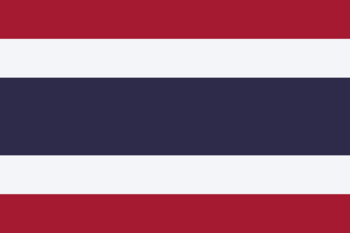
- Crushing the Populace: Having acquired Cambodian and Malaysian territory for their role in World War II, Thailand has tried assimilating the ethnic minorities there, far more radically than even OTL.
- Egopolis: After the Franco-Thai war, a part of the newly annexed territory from Cambodia was reorganized into the 'Phibunsongkhram Province' being named after Plaek Phibunsongkhram when he was still Prime Minister of the Kingdom.
- Fascist, but Inefficient: Thaification programs are actively rejected by many of the minorities living in Thailand, forming insurgencies that destabilize their grip over the southern province and conquered territories.
- The Migration:
- Countless minorities from Burma flee to Thailand, much to the chagrin of the latter's populace.
- Similarly, Japanese migrants have also begun settling in Thailand and opening more small businesses than the local Thais, even driving some into bankruptcy.
- People's Republic of Tyranny: Following Phibunsongkhram's coup against the monarchy, Thailand was officially turned into a republic and the ruling party calls itself the "People's Party" in English. However, this supposed democracy is a fraud, with all power concentrated to the Khama Ratsadon and anyone who speaks out against it is suppressed.
- Succession Crisis: The power vacuum left by Plaek's death can worsen if Ananta Samakhom Hall gets bombed by a terrorist attack, delaying the Assembly's attempt to confirm a new President.
- Teeth-Clenched Teamwork:
- The Thai National Army is wracked with factionalism, specifically between the Soi Ratchakru and Sisao Thawaet factions.
- The Seri Thai movement is an anti-establishment faction opposed to Phibunsongkhram and the current Khana Ratsadon dictatorship. Beyond this shared enmity, the movement is ideologically split between the pro-royalist Seni and the left-wing Pridi.
Plaek Phibunsongkhram
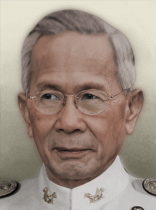
- Minor Major Character: Plaek is the chief architect behind Thailand's rapid industrialization and cultural programs, transforming the humble Thai monarchy into an industrialized nation directly inspired by the fascist movements in Italy and Germany. However, Plaek doesn't play much of an active role in the game itself, as he'll pass away shortly after the game's start.
- Playing Both Sides: Underneath his facade of loyalty to Japan, Plaek has been covertly feeding the CIA presence in Thailand, starting a shadow war between Japan and the United States to ensure that neither side has too much influence over his nation.
- Plot-Triggering Death: His death triggers a succession crisis that determines who will lead Thailand and shape the country in their image.
- The Quisling: Plaek secretly despises that he's had to submit Thailand under Japanese military envoys, which is why he's been sending some support to the CIA to weaken the Japanese presence in his country.
- Repressive, but Efficient: Plaek's modernization and cultural rejuvenation programs worked in turning Thailand into a prosperous nation, but they came at a heavy human cost.
- Villain with Good Publicity: Plaek is adored across Thailand for his abolition of the unpopular Thai monarchy and his expulsion of the European imperialists in Southeast Asia.
- Villainous Friendship: Despite their ideological incompatibilities, Plaek had a friendly relationship with Thawan, which could influence the latter's appointment as president.
- War Hero: He's a renowned war hero to Thailand, which contributed to the reason why he managed to become prime minister of Thailand.
- We Hardly Knew Ye: Plaek suffers a stroke and dies at around a year and a half after the game's start.
Sang Phathanothai

- Bookworm: The young Sang was so obsessed with reading that it ruined his eyesight and forced him to wear glasses.
- Cincinnatus: Subverted. After Plaek's passing, Sang gets nominated as caretaker president and he promises to step down when a new cabinet is assembled. However, he can break this promise after a failed military coup, getting himself confirmed as President to continue the legacy of Plaek.
- Commie Nazis: While still a radical Thai nationalist in the same vein as the rest of the Khana Ratsadon, Sang is also deadset on implementing radical economies policies that will greatly benefit working class Thais.
- Oppose What You Suffered: Having suffered a childhood of poverty, Sang seeks to help uplift Thailand's poor with his vision of a new revolution once he becomes leader.
- Poverty Food: Growing up in absolute poverty, Sang's usual lunch was constrained to water, only discovering eating utensils when he arrived in Bangkok.
Thanom Kittikachorn
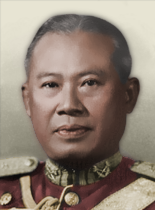
- General Ripper: Thanom is proud of the many military battles he's ruthlessly led in his career and is easily the most despotic leader who can take power in Thailand.
- Meet the New Boss: If Thanom takes power in Thailand, not much will change from the Plaek administration, as the populace is once more subjected under a fascist government, only with a different leader.
- Military Coup: Shortly after Plaek's death, Thanom can launch a military coup to install himself as dictator of Thailand.
- Undying Loyalty: Wishing to maintain the status quo of Thailand, Thanom wants to maintain Thailand's pledge of loyalty to Japan.
Praphas Charusathien

- Dragon Ascendant: After Thanom is killed by dissident naval officers at the Battle of the Chao Phraya River, Praphas is named his successor.
- The Purge: The first thing he does as President is conduct a thorough purge in the government of any potential sympathizers to the coup that murdered Thanom.
- Red Scare: During his inauguration speech, Praphas firstly blames communists for murdering his predecessor and threatening to destabilize all of Thailand.
Kris Sivara
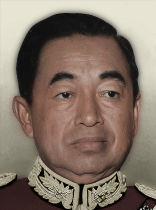
- Even Evil Has Standards: While supportive of Plaek's dictatorship, Kris is disturbed by the barbaric suppression instituted by Thanom and Praphas if he leads Thailand, which drives him and his supporters to try couping the Kittikachorn.
- The Starscream: Kris plans to betray and coup Thanom to end his over violence for good.
- Unwitting Instigator of Doom: His attempted coup against Thanom has a chance of failing, which cause Praphas to take power instead, who is even more brutal than Thanom.
Kriangsak Chamanan

- Cincinnatus: After being handed power by Kris, Kriangsak promises to reestablish free elections as quickly as possible.
- A Lighter Shade of Grey: The government he oversees isn't perfect. Kris still wields a dangerous level of influence in the government and the economy is dominated by the oligarchs. However, it's at least more stable and less oppressive than the past two decades Thailand has been through.
- War Hero: He's a well-respected general who is popular among the Thai people.
Chatichai Choonhavan
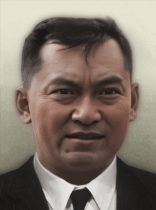
- Emergency Authority: Chatichai can declare martial law as a response to the oil crisis, which will either result in an unparalled centralisation of power to himself if it was temporarily declared or his own Prime Minister sidelining Chatichai if it was permanently declared.
- A Lighter Shade of Black: While despotic, Chatichai is no where near as repressive as the more brutish Thanom.
- Meet the New Boss: Of all of Plaek's potential successors, Chatichai's rule is the most identical to his predecessor's.
- Nepotism: While a skilled military commander in his own right, Chatichai being the son of Field Marshal Phin Choonhavan has certainly helped in elevating his status in the military.
- Pragmatic Villainy: In response to the riots that breakout in Thailand over the oil crisis, Chatichai can make massive widepread reforms that include the dissolution of Khana Ratsadon, the future implementation of a new constitution and the announcement that elections will be held in the future. However, many believe that Chatichai only issued these wide-sweeping changes with such speed so that only he can properly react to them, allowing him to cement his rule over the nation.
- Puppet King: If martial law is declared permanently, Chatichai will be turned into a puppet of his own Prime Minister, Pramarn Adireksarn, who seizes de facto control of his government after making an alliance with the military.
- Repressive, but Efficient: Upon coming to power in a military coup, Chatichai is set to use his web of influences and military prowess to create a productive, authoritarian government.
- Secret Police: Upon taking power, Choonhavan's administration is propped up by a system of secret police who suppress any domestic threats to Thailand's security.
Thawan Thamrongnawasawat
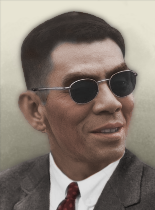
- Cincinnatus: After taking power in Thailand, Thawan announces new democratic elections to be held, heralding a new age of freedom for the country.
- Internal Reformist: With or without Japanese aid, Thawan plans to massively reform Thailand's infrastructure, military, and even some parts of the government through democratization.
- The Quiet One: Thawan is noted to be a quiet and reserved figure, which belies his very ambitious plans.
- Teeth-Clenched Teamwork: Admiral Thawan's coalition of support is but a house of cards, only tacitly supported by military leadership, with it being likely for him to be couped by a different military faction before he is able to democratise Thailand.
- Token Good Teammate: Unlike his peers in the military, Thawan has refused to indulge in any ideological militarism or corruption.
Khuang Aphaiwong

- Defector from Decadence: He took part in the Siamese revolution and used to be a minister, but was disgusted by Thailand's vow to the Japanese and Phibun's repressive regime, causing him to resign and disappear from the spotlight until Thawan potentially restores democracy to Thailand.
- The Determinator: Khuang has dreamed of a free and democratic Thailand for a long time and is determined to see it come into fruition should he become President.
- Royal Blood: Khuang was born into the now deposed Siamese royalty.
- Short-Lived Leadership: If elected, Khuang will only serve for 6 months before passing away, being succeeded by Seni or Lekha from the Democrat Party.
Seni Pramoj

- Arch-Enemy: Seni is the the most prominent opponent to Phibunsongkhram and his regime.
- Dark Horse Victory: As a former member of the disgraced Seri Thai movement, Seni is unlikely to win an election, with many expressing surprise if he actually does.
- Meet the New Boss: Downplayed, after succeeding Khuang, Seni swears to use his power to uphold traditional values and preserve the course set by Khuang.
- Reassigned to Antarctica: Seni was unofficially sent on exile from Thailand when he was assigned as an ambassador to the United States in 1940.
- Taking Up the Mantle: After Khuang passes away, Seni can succeed him as president and vows to preserve the course he set for Thailand.
- Took a Level in Idealism: After the Axis victory in World War II, Seni resigned to the military autocracy established in Thailand, but his optimism in reforming the country can be restored if Thawan takes over and sets up democratic elections.
Lekha Aphaiwong

- Breaking the Glass Ceiling: If she succeeds Khuang, Lekha becomes the first female president in Thailand.
- Internal Reformist: As the favoured candidate of the young liberal activists, after succeeding Khuang, Lekha promises to continue and expand on his economic reforms.
- Taking Up the Mantle: After Khuang passes away, Lekha can succeed him and continue the work of her late husband.
Pridi Banomyong

- Defector from Decadence: He was once a proud nationalist who was friendly to Khana Ratsudon, but as Plaek began turning Thailand into a military dictatorship, Pridi grew disgusted of the Khana Ratsudon.
- Internal Reformist: If elected after Thawan's resignation, Pridi will commit himself to reform Thailand away from its military dictatorship into a functioning democracy.
- Reassigned to Antarctica: Owing to his lack of loyalty to the Khana Ratsudon, Pridi was shuffled around into menial positions in Plaek's government, greatly reducing his ability to oppose the Grand Marshal.
Pramarn Adireksarn

- Red Scare: During his election campaign, Pramarn's slogan is "right to kill left", with his victory speech having him vow to protect Thailand from "leftist agitators".
Supha Sirimanon

- Internal Reformist: Supha promises radical economic reforms to cure the ills of Thailand.
- Taking Up the Mantle: As a protege of Pridi, Supha promises to enact economic change resembling that detailed in Pridi's Yellow Book dossier.
Puey Ungphakorn

- Character Catchphrase: His famous political slogan is "from womb to tomb", referencing his platform for better social security that will last a lifetime for everyone.
- Suicidal Pacifism: Subverted. His opponents in the right-wing and military frequently accuse him of this, claiming that he's too pacifistic and weak. To prove their claims, they often cite his opposition to the security forces' handling of the Thammasat University raids, which highlights that they're too politically biased to have their accusations taken too seriously and, in either case, it doesn't stop most of the nation celebrating his inauguration.
Kukrit Pramoj

- Royal Blood: Kukrit is a scion of the Pramoj noble family.
- Sibling Team: Kurkit ascends to the presidency through the strength of a coalition between his Progressive Party and his brother Seni's Democrat Party.
Thammanoon Thien-ngern

- President Evil: Thammanoon, a fascist, can get elected into power after liberal democracy returns to Thailand.
- Red Scare: One of the three major pillars that Thammanoon was elected on is "crushing communists".
Chalard Hiransiri

- Meet the New Boss: Chalard's coup represents a return to the old status quo of the days of the Khana Ratsadon, with his military clique being affiliated with many of their old bureaucrats.
- Military Coup: Chalard can potentially seize control of Thailand and put an end to democratic rule, declaring an end to the "mismanagement and instability of previous governments".
- The Purge: Chalard starts his rule by purging the Thai administration of disloyal bureaucrats and officers as he rules with a heavy hand.
Sangad Chaloryu

- Military Coup: Sangad can potentially coup the Thai government as a "preventative measure" against "ambitious and disloyal" elements from the civillian and military administration.
- Puppet King: Many suspect that the high-profile members of right-wing think tanks that make up his new cabinet are the true power behind his junta.
- Red Scare: Part of the reason behind his coup is to strike against "leftist agitators threatening our country".
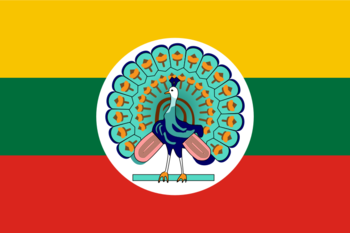
- Cincinnatus: Subverted. After suspending the 1953 Constitution, the collaborationist regime promised to restore it once national security was achieved. This vow never came to fruition and the people are becoming increasingly impatient over being kept in the dark.
- Paper Tiger: Aung San's administration proclaims to be revolutionary and the rightful government of Burma, yet they barely control anything beyond six miles of Rangoon.
- Won the War, Lost the Peace: Japan's conquest of Burma would prove to be a burden on the puppet government, as communist and minority uprisings continue to plague the country. The people are not impressed by the lack of progress in rooting them out, which could threaten the legitimacy of the entire government.
Aung San

- Be Careful What You Wish For: He got his dream of becoming Burma's president, but his grand ambitions eventually backfired. As the head of the regime, Aung San became disdained by religious groups for his secularism and rebel groups who continue to resist Japanese occupation. More than a few people wonder if he's capable of weathering such troubles.
- President for Life: He formally serves as interim president, but there are no constitutional limits on his power, especially as the suspension of the 1953 Constitution has yet to be lifted. Aung San himself is desperate to hold on to his power, willing to use extreme prejudice to perceived threats.
- The Quisling: Collaborating with Keiji Suzuki and the Japanese has benefited Aung San greatly, awarding him the presidency over the more disliked Ba Maw.
- The Rival: When Burma was granted its "independence" by Japan, Aung San became a rival to fellow collaborator, Ba Maw. Ultimately, Aung San came out on top when a pressured Burmese legislature was forced to nominate him as interim president.
Ne Win

- Ambition Is Evil: Ne Win is very ambitious, having joined Dobama Asi Ayone in 1931 and worked with the Japanese to disrupt British lines, with their being hints given that he seeks to get rid of Aung San to establish his "great Burma".
- Dragon with an Agenda: While he serves as Aung San's Prime Minister, Ne Win has his own plans for Burma that differ from Aung San's vision, prepared to do whatever is necessary to protect his nation.
- Military Coup: In 1952, he and Bo Hmu Aung marched on the Presidential Palace in Rangoon, and forced a plebiscite among the Burmese legislature that nominated Aung San as President.
- Mysterious Past: Little is known about his pre-revolutionary past, with even his birth date being uncertain.
- Repressive, but Efficient: Subverted. Initially, Ne Win established the Tatmadaw's reputation as a stunningly efficient but brutal anti-guerrilla force, however, the Tatmadaw has since become overstretched as the guerrillas' resolve merely rises and rises.
Thakin Nu

- The Determinator: Thakin Nu has dreamt of a democratic, just and socialist Burma since he first became a revolutionary, realising that need needs to take drastic actions to change the fate of Burma.
- The Remnant: After the 1954 Constitutional Amendment, whereby communism was banned under threat from Japan, Thakin Nu remains the only prominent socialist in Aung San's government after his comrades that shared his Marxist views in the Dobama Asi Ayone and the Communist party were purged.
Thakin Mya

- The Determinator: Thakin Mya has persevered for many years, fighting for three decades as an independence fighter and continuing to fight for a bright future for Burma.
Bo Hmu Aung

- Bookworm: An avid reader, he spent his youth studying and memorizing Buddhist literature.
- Military Coup: Alongside Ne Win, he marched on the Presidential Palace in Rangoon in 1952 and installed Aung San as Burma's leader, deposing the unpopular Ba Maw.
The Philippines

- 0% Approval Rating: Downplayed. While the KALIBAPI-run government is seen by many Filipinos as a glorified puppet of the Japanese, there remains just enough popular support for it to maintain some measure of legitimacy. Depending on who becomes president should it survive the Balintawak Blitz, it could potentially make a concerted effort to mend that image.
- Aristocrats Are Evil: The governors ruling the countryside are nobles in all but name, many of them even belonging to political dynasties that have had a stranglehold over their respective regions for decades. The dire situation in the provinces in contrast to their families' personal wealth all but implie this trope.
- Authority in Name Only: On paper, the Philippines is a stable, independent, democratic member-state of the Co-Prosperity Sphere. In reality, the KALIBAPI-run government only controls Southern Luzon, Palawan and some parts of Visayas, with the 14th Army effectively calling the shots on Tokyo's behalf. The rest of the nation is under the De Facto rule of either the Communists or the FPR. In most cases, it's not a question of whether Manila will fall but who will get there first.
- Back for the Dead: Benigno Ramos
 , a Japanese collaborator in both OTL and TNO, appears in one event pondering his life before dying of a heart attack.
, a Japanese collaborator in both OTL and TNO, appears in one event pondering his life before dying of a heart attack. - Be Careful What You Wish For: A Japanese officer clamors to become part of the Guard Division, given the highest honor of defending the Emperor, but rarely sent overseas to risk his life and fight for Japan. He sacrifices much to achieve his dream, from sending bribes to breaking up with his girlfriend over political differences. However, his plan ends up backfiring when his division is sent to the Philippines to fight the partisans and almost certainly die there.
- Cassandra Truth: It seems pretty unlikely at first for yet another Japanese invasion to happen, with the collaborators' attempts to stop one just coming across as them justifying their atrocities. They are quickly proven right however should they be soundly defeated in the civil war and the United Filipino Front breaks down, with Japan swiftly launching a counter-invasion to bring the Philippines under its fold.
- Civil War: Shortly after the Yasuda Crisis, the AFRSR and FPR will form an alliance to liberate the Philippines from the puppet Second Republic. If the former triumph, the Philippines can fall into a second civil war if the AFRSR and FPR refuse to form a coalition government, fighting each other and a Japanese retaliatory invasion from the 14th Army.
- Dark Horse Victory: Downplayed. While the likelihood of the KALIBAPI surviving the Balintawak Blitz doesn't seem likely at first glance, it is possible for the Second Republic to triumph, both giving the Japanese a stable foothold in the region and potentially opening a path towards actual reform.
- I Did What I Had to Do: The more reformist-minded factions within the KALIBAPI view cooperation with Japan and Co-Prosperity Sphere "membership" not only out of self-preservation, but as a necessary evil. Beyond hopes of greater leverage for ensuring genuine independence, restoring order to the country also means avoiding the prospect of the Japanese launching yet another bloody invasion.
- Les Collaborateurs: The government is ruled by the Japanese collaborator KALIBAPI, which traces its roots to back to WW2.
- Heel Realization: Benigno Ramos, a Filipino collaborator, thinks back on his life as he lays dying on a hospital bed, realizing how wrong it was to betray his country and turn a blind eye to the Japanese atrocities against his fellow countrymen. His last living thoughts are spent berating himself as idiotic for ever throwing his lot in with Japan.
- Home Guard: The Second Republic is reliant on both a vestigial Philippine Constabulary and MAKAPILI auxiliaries as the closest thing it has to a military. All of which answer to the Japanese 14th Army.
- People's Republic of Tyranny: The "republic" of the Philippines is corrupt, ruled by an autocratic presidency, and heavily biased in favor of Japanese collaboration. Any seditious behavior is also a warrant to face arrest.
- Puppet State: The Second Republic is propped up by Japanese bureaucrats and their Filipino collaborators, creating a sham democracy that proclaims their independence, but nonetheless remains tied to the Sphere.
- Small Role, Big Impact: Downplayed. While not insignificant, the Philippines is one relatively small part of the Co-Prosperity Sphere. What happens to KALIBAPI-run government, however, can not only have far-reaching consequences across Southeast Asia, but also stoke greater geopolitical tensions between Japan and the United States.
- Unwitting Instigator of Doom: The reconstruction of the Republic officially ends when four MAKAPILI auxiliaries play a drunken game of Russian roulette, accidentally firing a live bullet that causes several nearby constabularies to also fire and start a barfight. This eventually escalates into a riot, dubbed the Manila incident, sapping most of the Constabulary and 14th Army's manpower. Even worse, if the reconstruction is unsuccessful, the growing chaos requires Inada to intervene and dissolve the National Assembly, installing an unstable regime in its place.
- We ARE Struggling Together: The myriad KALIBAPI factions and political clans struggle to find much common ground, even with the constant shadow of the Imperial Japanese Army behind their back, or the ever-encroaching threat posed by both the AFRSR and Free Philippine Republic.
- Won the War, Lost the Peace: The Philippines was one of the many territories acquired by the Sphere following their victory in World War II, but the Second Republic has since struggled to control the countryside, unable to finish off the communist and American partisans still fighting to liberate the archipelago.
José Yulo
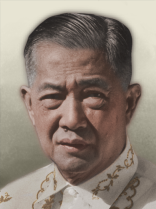
The current president of the Second Republic, who was picked as the compromise president after his predecessor Jose P. Laurel's death during the 1959 Philippine War. While he successfully managed to push the communist rebels back all those years ago, Yulo now leads a country on the verge of a second rebel offensive and tries his best to keep it all together.
- Cincinnatus: Yulo only plans on staying president until he can handle the rebels in the Philippines. In the event of victory, however, he winds up being killed before he could properly retire.
- Failure Is the Only Option: If Yulo unites the Philippines under his republic, he won't savor his victory for long, as he'll get assassinated shortly after.
- I Did What I Had to Do: Yulo joined KALIBAPI out of pragmatism and a desire to mitigate Japanese excesses rather than genuine support for the regime.
- Mandatory Unretirement: Having served under both the Commonwealth and the Republic, Yulo hoped to refire from his post in 1959 and become a more modest corporate lawyer. However, the death of President José Laurel and the emergence of the Filipino rebels threw a wrench into Yulo's plans and he was quickly rushed back into becoming a compromise president for the Greater East Asia Ministry and the KALIBAPI's "Laurelist" faction.
- Mood Whiplash: After crushing the partisans in the Blitz, Yulo joins the victory celebration, as he's hailed as the Republic's heroic savior. Then, he suddenly gets assassinated and passes before a hospital can save him.
- Plot-Triggering Death: If the Second Philippine Republic wins the Balintawak Blitz, Yulo will get assassinated, throwing the nation into chaos and forcing Japan to oversee a difficult period of reconstruction to keep the islands stable until a successor can take over.
- Richard Nixon, the Used Car Salesman: In OTL, Yulo was appointed Chief Justice of the Supreme Court in 1943, and eventually had a failed bid for the Filipino presidency after WW2. In TNO, he finds himself becoming president of a country on the verge of chaos.
- Screw This, I'm Outta Here: Should the guerrillas reach the outskirts of Manila, he and his cabinet will be evacuated to Tokyo before the ensuing siege.
Quintín Paredes

The Minister of Public Works and Communications during President Laurel's time, Quintín Paredes' natural talent at national politics has cemented himself as a kingmaker within the KALIBAPI and he now uses his position to aid President Yulo in his reformist agenda.
- Beneath the Mask: Behind Paredes' outward and vocal support for Japan is a man only doing so as a means of helping his countrymen stand on their own feet, even if that means using the Sphere's resources to do it.
- Internal Reformist: Upon his election, Paredes vows to liberalize and reform the Republic, ending its despotic administration.
- Landslide Election: If Paredes is elected, his victory is a landslide due to his political acumen and role as a kingmaker in the KALIBAPI.
- Meet the New Boss: Among Yulo's potential successors, Paredes is the doctrinaire Laurelist, being the most likely to continue Jose P. Laurel's ideas at least in sprit.
- The Quiet One: Paredes is a soft-spoken individual, which belies how cunning and ruthless he can be.
- Status Quo Is God: Downplayed. Should Paredes be elected following a KALIBAPI victory, he proceeds to continue the legacy of the Second Republic's first president, Jose P. Laurel, and generally remain a loyal Japanese "ally." On the other hand, he also vows to continue the reforms started by Jose Yulo, though whether he intends to follow through with those promises remains to be seen.
Claro M. Recto
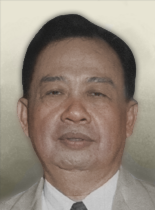
The Minister of Foreign Affairs and a nationalist firebrand within the party.
- Despair Event Horizon: If the reconstruction fails and the 14th Army dissolves the National Assembly, Recto silently tears up in despair, unable to bear seeing his nation humiliated and destroyed once more.
- Hypocrisy Nod: Recto is shown to be keenly aware of how for a committed nationalist, he seem far too eager to trade one colonial overlord for another. He rationalizes to himself, however, that if the end-result means a truly independent Philippines, even collaboration with Japan is worth the heavy price.
- I Did What I Had to Do: Recto considers his collaboration with Japan an acceptable price to pay for the freedom of the Philippines.
- Patriotic Fervor: In his electoral speech, Recto makes an incredibly nationalist speech, vowing to keep the Philippines free of colonial exploitation, no matter the cost.
- Principles Zealot: Recto is an uncompromising nationalist who will stop at nothing to the Philippines free of any colonialism. This could potentially come back to haunt him, however, risking the ire of his Japanese allies.
- Was It Really Worth It?: Privately, Recto wonders if the freedom attained by the Philippines was worth abetting the many crimes committed by the 14th Army against his people.
Sergio Osmeña Jr.
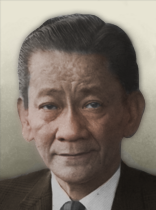
- Dark Horse Victory: Owing to his paradoxical views, cozy business ties with the Japanese and relative isolation within the KALIBAPI, Osmeña is seen by the local press as a black sheep. Which makes his victory all the more shocking.
- Hero with Bad Publicity: Despite being one of the most reform-minded and benevolent figures within the government, he's smeared by his erstwhile peers as an ambitious would-be despot, while his public reputation is that of a sleazy corporate collaborator.
- Historical In-Joke: In OTL, Osmeña was a senator who lost to Ferdinand Marcos in the 1969 presidential elections, eventually winding up in exile as the latter declared martial law. Here, he finally gets his chance to run the country.
- I Did What I Had to Do: As a businessman and a relative outsider in Manila politics, Osmeña considers his dealings with the Japanese as necessary in order to both help his countrymen and make ends meet.
- Internal Reformist: Osmeña is by far the most reform-minded out of Yulo's successors, as his electoral speech is noticeably absent of any vows to maintain the Republic's Laurelist values.
- Reasonable Authority Figure: In the aftermath of the Balintawak Blitz, Osmeña urges all Filipinos to reconcile with each other so that they may progress as a united nation.
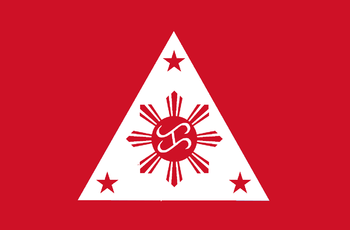
- Allohistorical Allusion: The AFRSR is very much based on the real HUKBALAHAP insurgency.
- Capital Offensive: Their ultimate goal is to capture Manila and proclaim a republic based on Socialist principles with Manila as its capital.
- Enemy Mine: If the FPR and AFRSR succeed in overthrowing KALIBAPI, they can form the United Filipino Front to both prepare for the inevitable Japanese invasion and set up a coalition government.
- Great Offscreen War: The socialists attempted to topple the Republic in the 1959 Philippine War, but their efforts were halted and a ceasefire was called in 1961.
- Lesser of Two Evils: To the United States, a PRP takeover of the Philippines is not ideal, but preferable to a 14th Army victory, because they will at least deny Japan an important territory in Asia.
- Realpolitik: Despite strong ideological disputes with the Americans and an unwillingness to subordinate themselves to the US, Taruc and his supporters are pragmatic enough to welcome OFN aid, if not direct membership into the OFN proper.
- Teeth-Clenched Teamwork:
- Originally, the PKP was divided between José Lava and Luis Taruc, after they retreated to the Cordilleras Base Area. Taruc eventually won the power struggle and now prepares the AFRSR for another war against the Republic.
- The AFRSR begrudgingly works with local landlords to keep the army alive, even if they consider it a temporary arrangement.
Luis Taruc y Mangalus
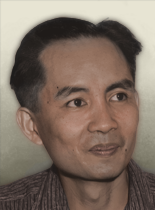
- Allohistorical Allusion: He leads the HUKBALAHAP in an armed struggle against the Filipino government, just like he did in Real Life.
- Chummy Commies: Compared to his predecessor, Jose Lava, Taruc is much more willing to compromise, viewing a dogmatic commitment to Marxism a detriment to the Revolution. Though some of the hardliners in the AFRSR are implied as becoming uneasy with his discarding of old socialist tenets.
- Nice Job Breaking It, Hero: If Taruc decides to take a harder stance against non-socialist elements and attempt to "liquidate" them, this not only destabilizes the AFRSR's hard-won gains. But it also gives Ferdinand Marcos an opportunity to stage an armed coup and seize power by virtue of removing everyone else standing in his way.
- Klingon Promotion: A non-lethal variant. During the chaos of the 1959 retreat, Taruc delivered a scathing "Reason You Suck" Speech to former General Secretary Jose Lava, saying that his caution and dogmatism costed the revolution far too much and that he should be removed before their chance at true socialism is lost forever. Unsurprisingly, it was decided that Taruc shall replace Lava as the General Secretary following some desperate and frenzied applause.
- The Purge: To consolidate power and control following an AFRSR victory, Taruc can opt to liquidate all non-socialist elements that could pose a threat to his new regime. This backfires, however, resulting in his death and Ferdinand Marcos usurping power.
- Reasonable Authority Figure: Compared to his predecessor and rivals within the party, Taruc isn't stuck up on dogmatism and can compromise with non-socialist Filipinos in order to genuinely win over the people. He could also opt to not double-down on implementing socialism in favor of compromising with the rest of Filipino society.
- Red Baron: Is called "General Alipato" by his fellow revolutionaries.
- Start My Own: Taruc doesn't take kindly to being snubbed by the United States after the Blitz and will reform the AFRSR into the PRP, as an opposing faction to the Americans.
- Well-Intentioned Extremist: Taruc resorts to some underhanded tactics to secure his power for the sake of building a socialist utopia for the Filipino workers and peasants.
Ferdinand Edralin Marcos

Ferdinand Edralin Marcos is the head of the Marcos family, the most powerful political dynasty outside Manila and lords of the Ilocos region. He and his father have managed to keep the Japanese and Second Republic at bay with their private army. After his father’s death, Marcos struck a deal with the AFRSR and is now willing to contribute to an upcoming rebel offensive.
- Allohistorical Allusion:
- Ferdinand Marcos gained infamy for his dictatorial rule in the Philippines, from 1972 to 1986. In TNO, he can seize control over the country under very different circumstances. Coincidentally, the Kilusang Bagong Lipunan (“New Society Movement”) is also the name of his political movement in OTL, while the Third Philippine Republic's flag is the same one used in the latter years of his real life rule.
- Marcos' ostensibly neutral foreign policy of playing both the Americans and Japanese to his own ends has echoes of Rodrigo Duterte's similar pretensions during his presidency.
- Beneath Notice: While Marcos is by no means insignificant, he's initially seen by the AFRSR as just another landlord that it has to deal with and tolerate in its struggle against the Japanese. This allows him to emerge as the most powerful man in the country, with Taruc's purges having eliminated or crippled most of his rivals.
- The Coup: Marcos stages an armed coup within months of the AFRSR's victory and Taruc's purging of non-socialists, resulting in the declaration of the Free Philippine Republic.
- Dark Horse Victory: While not insignificant, Marcos only really becomes a major contender should the AFRSR win, and if Taruc opts to purge all non-socialist opposition.
- Enemy Mine: While nominally aligned with the FPR, Marcos and his family’s private army found common cause with the AFRSR against the KALIBAPI. That goes out the window once the AFRSR wins, with Marcos instead aligning with every non-socialist within reach, including KALIBAPI remnants and a lone Japanese expat, to depose Taruc.
- Feudal Overlord: Marcos heads one of the most powerful landlord families outside Manila, with de facto control over the Ilocos region of northern Luzon.
- Red Baron: A future compass teaser
 has Marcos being referred to as the "Don of the North".
has Marcos being referred to as the "Don of the North". - The Starscream: Despite supporting Taruc in ousting the KALIBAPI, Marcos can seize the opportunity to depose Taruc himself in an armed coup.
- Team Switzerland: Marcos pursues an ostensibly neutral policy regarding the OFN and Co-Prosperity Sphere, being more content to curry favor with both sides to his country's (and his own) benefit. This potentially makes the Third Philippine Republic a regional Wild Card.

An American-backed guerrilla force based in Mindanao, made up of remnant Philippine Commonwealth and WWII-era US forces in the Philippines.
- Allohistorical Allusion:
- The Free Philippine Republic is partially based on the Free Philippines
 government in OTL WWII.
government in OTL WWII. - In real life, after the end of the war, Japanese soldiers continued to hold out for decades, mostly in isolation in the Philippines. Here, it's the Americans who are stranded and keeping up the fight.
- The Free Philippine Republic is partially based on the Free Philippines
- The Cavalry Arrives Late: Downplayed. After two decades of seeming inaction and neglect, the Free Philippine Republic can finally receive support from across the Pacific, from CIA advisors to direct OFN reinforcements.
- Emergency Authority: The FPR's government tries to handwave the underlying feudal oligarchy and corruption as consequences of wartime measures which would eventually be dealt with. While few actually believe it, it's up to the player if the FPR does follow through.
- Enemy Mine: If the FPR and AFRSR succeed in overthrowing KALIBAPI, they can form the United Filipino Front to prepare for the inevitable Japanese invasion.
- Fire-Forged Friends: After decades of fighting the Japanese, the Filipino and American soldiers under Fertig's command have become these.
- Full-Circle Revolution: If the communists and 14th Army are defeated by the FPR, half of the population recognizes that true independence is out of their reach again, as the Americans have practically replaced the Japanese as their new masters and intend to exploit the archipelago for their own gain.
- Government in Exile: The old Commonwealth government is still technically active in America.
- Here We Go Again!: If the FPR wins, not only is the prospect of a Japanese invasion likely, but it could wind up escalating tensions as the US and OFN become directly involved.
- Meet the New Boss: Downplayed. If the FPR takes control, the old Commonwealth government is formally reinstated under OFN oversight, effectively bringing the Philippines under de facto American rule. With the prospect of an imminent Japanese invasion, however, Filipinos are willing to tolerate it, if this means direct OFN support and eventual independence.
- Old Soldier: The American soldiers within the FPR have been fighting the Japanese for 21 years, with some keeping old photographs and dog tags as mementos of a world an ocean away.
- People's Republic of Tyranny: The remnant American colony in the Philippines does not fit the "free" or "republic" moniker in its name. The so-called democracy is more akin to a feudal oligarchy, with the government bartering goods from the local provinces in exchange for guns and protection, even as the peasants languish under this oppression.
- La Résistance: The Free Philippine Republic is home to resistance fighters who have been specially trained by old Filipino and American soldiers to overthrow the Japanese collaborationist regime in Manila.
- Teeth-Clenched Teamwork:
- García has been forced to make some deals and favors with the local dynasts in exchange for supplies, lest his men starve.
- There is a sharp divide in the population over whether to return to the old system of American dependence or to forge their own unique path. If the FPR takes over the Philippines, this important question will need to be answered in the election.
Carlos Garcia y Polestico
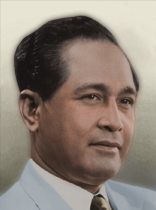
- Beware the Quiet Ones: Given his quiet demeanor, it's easy to underestimate the fact that he's also a cunning politician who's been playing off the Japanese and the Americans to preserve what little independence the Philippines has left.
- Les Collaborateurs: Garcia had a relatively accelerated career under the American colonial system, advancing through politics as a congressman, a governor, and a senator. His career was only cut short when Japan invaded and forced him underground.
- Corrupt Politician: His administration is built off of corruption and favoritism to local governors who accept his feudal-like bartering.
- Feudal Overlord: Garcia's regime is practically run like a feudal lord; he offers guns, titles, and protection to any local magnates who submit to him, giving him the food produced by the peasants.
- I Did What I Had to Do: Garcia knows that the FPR's corruption and feudal-style oligarchy make a mockery of its pretensions to freedom and democracy. He considers this state of affairs as a temporary and necessary evil, however, in the name of protecting what little sovereignty his country has left.
- Know When to Fold 'Em: Should the UFF be accepted or the country be fully unified under the FPR, Garcia quietly accepts that his days are numbered, trusting the Filipino people to choose their own destiny as a free nation.
- Necessarily Evil: Garcia oversees a presidency of corruption and sycophancy, all in service to the greater good of preserving his republic's independence from Japan and the United States.
- Red Baron: Garcia is also known as the Bard from Bohol.
Wendell Fertig
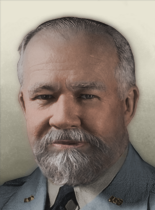
- Cincinnatus: Fertig plans to step down from his position, once the Japanese are expelled from the Philippines and the "light of freedom" is restored to the archipelago. If Magsaysay's countercoup is thwarted, leadership will be passed down to Avelino.
- Defector from Decadence: When the United States surrendered the Phillipines in the Akagi Accords, Fertig renounced his American citizenship and continued resistance to liberate the Philippines under the Free Republic.
- Ignored Expert: García has practically no respect for Fertig, who is often relegated to worthless positions so he can't offer helpful counsel.
- Military Coup: Believing that Garcia will drive the Free Republic to ruin and render every American sacrifice null, Ferig will ally with Avelino and launch a military coup to try overthrowing him.
- Old Soldier: Has been leading the American-affiliated guerrillas fighting the Japanese for 21 years.
- Short-Lived Leadership: Fertig will only take charge until he's either ousted by Magsaysay's countercoup or power is passed on to Avelino. Either way, he's not going to be sitting as leader for long.
José Avelino y Dira

- 0% Approval Rating: Avelino is hated by nearly everyone in the country as a corrupt, power-hungry politician and even his military allies can barely tolerate him.
- Be Careful What You Wish For: His longtime wish was to become president of the Philippines, which is granted if Fertig's coup is successful and staves off a countercoup by Magsaysay. Unfortunately for him, his newfound position becomes a curse, as he's now become the most hated man in the Philippines and unable to command the respect he thought came with the job.
- Military Coup: Always desiring the presidency for himself, Avelino supports Fertig's military coup so he can topple García and seize the position.
- Short-Lived Leadership: Even if Avelino seizes Manila, he'll have no choice but to accept the creation of the United Filipino Front, giving up his short-lived presidency to set up post-war elections he's not in the running for.
- Voluntary Vassal: With the support of Fertig and the military, Avelino will align the Philippines under the American sphere.
Diosdado Macapagal

- Dark Horse Victory: Macapagal's rise to the presidency is an unexpected development to many, especially if García retained power and rejected the UFF, giving himself a 70% chance of being elected.
- Hope Bringer: His election represents a turning point in history for Filipinos, one where they can engage in free trade and enjoy more opportunities than they ever could.
- Les Collaborateurs: Subverted. On top of being The Mole within the KALIBAPI, Macapagal is happy to work with the United States. That said, he'd rather do so as an equal ally rather than a glorified colonial puppet.
- The Mole: Macapagal worked inside the Japanese collaborationist regime, until he was discovered as a spy for the resistance and forced to flee south.
- Rags to Riches: He started life in a rural family of pig farmers, which gave him the nickname "the Poor Boy from Lubao". However, his work ethic and financial help from his relatives, he excelled in his education and became a prominent politician in his own right.
Post-Balintawak Blitz
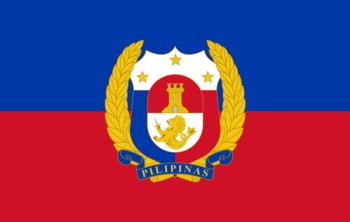
- The Alliance: The Coalition Government can be formed if the AFRSR and FPR achieve victory in their guerrilla war against the Japanese and peacefully unite together in a joint government to fight the upcoming Japanese invasion.
- Bilingual Bonus: The text on their flag is Filipino for "Philippines".
- Closest Thing We Got: While the Coalition Government isn't the most desired outcome for the OFN, it's nonetheless seen as the next best thing, with the Americans still eager to provide aid and support to the liberated Filipinos.
- Democracy Is Flawed: In the interim period of reconstruction, a bicameral Congress is hastily created to oversee the process, but many of its congressmen fiercely debate over domestic matters and even get fistfights with each other, threatening to tear apart the nation, unless the reconstruction is successful. Otherwise, Ramon Magsaysay will stage a coup and assume power in the name of keeping the fragile nation together.
- Enemy Mine: Though the AFRSR and FPR are ideologically opposed to each other, they can unite together to form the Coalition Government out of a shared interest in helping the common Filipino people.
- Here We Go Again!: They have to face yet another Japanese invasion after booting out the collaborators, though with the AFRSR and FPR's forces united and some OFN help it won't be as one-sided as the previous invasion.
- Meet the New Boss: Downplayed. The Coalition Government nominally reinstates the institutions of the pre-War Commonwealth of the Philippines. Only this time, with the Filipinos themselves clearly in charge, albeit with some OFN aid.
- Teeth-Clenched Teamwork: The communists and FPR are reluctant to work together and their first meeting starts off tensely with both sides holding on to their guns. Fortunately, they eventually drop their weapons and begin the negotiations to form a coalition government because they have a mutual goal: defend the Philippines from a Japanese counter-invasion and rebuild the nation.
- Won the War, Lost the Peace: It's possible for the Coalition Government to fail their reconstruction campaign, leading to a military coup by Magsaysay.
Lorenzo Tañada y Martínez
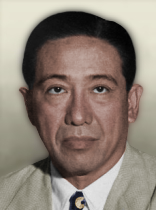
- Internal Reformist: In the Second Republic, Tañada has stood firm in his mission to liberalize the country, unafraid to criticize Yulo or the Japanese.
- Know When to Fold 'Em: When he sees Magsaysay prepare his coup and gather his men around the Palace, Tañada realizes that he's lost and peacefully steps down from his position, though spiting Magsaysay by refusing to meet him for the transition.
- Reasonable Authority Figure: Tañada has always espoused support for Filipino rights since the days of the Japanese occupation and he's fully committed to building a stable democracy for the Philippines.
- Universally Beloved Leader: Tañada is universally beloved across the Philippines, which made him the perfect compromise candidate to lead the Coalition, until official elections can be held. In the upcoming elections, Taruc can subvert this trope for Tañada by stoking dissent towards his perceived incompetence, allowing Taruc to win the majority of votes.
- Vetinari Job Security: Under the Second Republic, his political savviness and audacity had allowed him some measure of influence, despite both the KALIBAPI and Kenpeitai's efforts to apprehend him.
Diosdado Macapagal

Ramón Magsaysay y del Fierro

- Foil: He is this to Takayama Shinobu. While the 14th Army assuming control precludes more death and suffering for the Filipinos, Magsaysay's takeover is done with the express purpose of avoiding such a harrowing outcome.
- Military Coup: If the reconstruction fails, Magsaysay will launch a coup against Tañada and unofficially become its new dictator.
- Rags to Riches: Maysaysay was initially a humble mechanic from Zambales before rising to become a beloved general fighting for the Philippines' liberation.
- Rebel Leader: Magsaysay is a Filipino soldier who has been fighting against the Japanese colonial government in his home country and can be appointed as its leader if both the AFRSR and FPR win and unite together. Once in power, one of his first challenges is to ward off the Japanese counterinvasion by the Firipin Gunseibu.
- Red Scare: Magsaysay's biggest concern upon seizing power is eliminating the remaining communists in the Philippines.
- Serendipitous Survival: Unlike OTL, wherein Magsaysay died in 1957 from a plane crash, he's still very much alive by 1962, and can potentially become president.
- 10-Minute Retirement: Magsaysay initially retired from the resistance rather than cooperate with the communists in the Philippines. However, his retirement was cut short when his old friend and superior, Russell Volckmann, convinced him to rejoin in uprising against the Laurelist administration.

- Alas, Poor Villain: The 14th Army commits horrific war crimes during their invasion and are the most evil faction in the archipelago. However, there is a degree of pity surrounding their defeat, as the once vigorous survivors are left traumatized and sullen that they've not only failed a second time, but also seen more of their comrades slaughtered for a lost cause. As they retreat back to Japan, the soldiers bid one final, solemn farewell, as the transport ships are loaded with coffins of their dead comrades.No heroic deaths await us.
- Bilingual Bonus: The Firipin Gunseibu's kanji on their flag translates to "14th Army", the military organization in charge of the provisional state.
- Downer Ending: A 14th Army victory is the worst possible outcome that the Philippines can be subjected to, as they are once again dragged back into Japan's sphere of control and brutalized under a military regime far more violent than the Second Republic.
- Easy Logistics: Subverted. The 14th Army suffers a weekly debuff of losing supplies, which will make their conquest of the Philippines harder as time passes.
- Establishing Character Moment: The revitalized 14th Army are introduced launching a barrage at Lingayen Bay and murdering hundreds of civilians, showing how serious they are with avenging their past defeat and the levels of brutality they will descend to achieve their goals.
- Even Evil Has Standards: If the 14th Army reconquers the Philippines, a Japanese soldier recalls his company coming across a 12 year old boy, wielding a rifle and desperately trying to fight off the invaders. It's the first time that the company is taken aback, unwilling to kill a child, and even their CO takes the "burden" for once by shooting the boy for them.
- Evil Colonialist: The Firipin Gunseibu is a retaliatory Japanese invasion of the Philippines if the natives and/or Americans defeat the Second Philippine Republic, sent to bring the archipelago back into Japanese control.
- Know When to Fold 'Em:
- If the 14th Army is defeated for a second time, Japan declares the Philippines a lost cause and orders a difficult retreat, with hundreds of caskets being sent back to the Home Isles and the survivors despondent over their failure.
- The 14th Army can call for a ceasefire where they they retain control of Luzon and/or Visayas, dividing the Philippines in two.
- Roaring Rampage of Revenge: The 14th Army suffered thousands of casualties when they were forced to flee the Philippines after the Republic fell. Upon returning with Takayama at the command, the 14th Army survivors are eager to exact vengeance on the rebels. Even thousands of reserve troops were eager to sign up with the 14th Army so that they can restore Japan's dignity after the Republic fell.
- Took a Level in Badass: Having failed to defend the Republic in the Balintawak Blitz, the 14th Army will return back to the Philippines stronger than ever, thanks to Takayama's strict discipline and dogma.
Takayama Shinobu

The commander of the returning 14th Army following its defeat in Balintawak Blitz, hell-bent on crushing the rebellion and bringing the Philippines back into Japanese hands whatever the cost.
- General Ripper: Takayama plans on retaking the Philippines under the Japanese flag and will not be so lenient on the rebels for their uprising.
- My Country, Right or Wrong: Having already fought on the archipelago in World War II, Takayama knows that the campaign in the Philippines will be brutal, but he still follows Japan's orders to pacify the islands, no matter the cost.
- Necessarily Evil: Despite having witnessed the brutality of the original invasion, from Takayama's perspective, he believes that harsher reprisals are necessary to ensure that the locals would think twice from rebelling again.
- Noble Demon: Takayama genuinely cares for his subordinates in the 14th Army and is committed to seeing that their sacrifices are not in vain. Unfortunately for the Philippines, this translates into a far more ruthless campaign to ensure that no insurrection ever happens again.
- Pragmatic Villainy: If it were up to him, he would dissolve the Republic for its incompetence, especially after their failure to save Yulo from an assassination. However, he respects the reconstruction effort and lets them elect their leaders because the Emperor wants to keep the Republic and Takayama wouldn't dare defy him.
- Surrounded by Idiots: Takayama is frustrated by the Republic's inefficiency and claims that he could have prevented Yulo's assassination if he were present.
- War Is Hell: Takayama subscribes to this mindset, having witnessed the utter hell that Japanese soldiers had to endure during the Philippines invasion in World War II.
Inada Masazumi

The corrupt commander of the 14th Army. Much like the previous commanders before him, Inada doesn't really care at all for the army's sorry state and is more pre-occupied with enriching himself.
- Better to Die than Be Killed: If the Second Philippine Republic is defeated in the Blitz, Inada will commit suicide before he can be captured.
- Corrupt Politician: Inada is among the many 14th Army commanders who have taken "ignorable" amounts of money from the Republic to fill his own pockets.
- Deadly Euphemism: When the Japanese reconstruction of the Philippines fails, Inada is tasked to "stabilize" the country quickly, while implying that there will be grave consequences if he fails.
- Forgotten Fallen Friend: Inada's suicide largely goes unmentioned by most because everyone in the 14th Army is too focused on rebuilding their strength and exacting revenge on the partisans.
- Let No Crisis Go to Waste: Inada has evidently benefited from the KALIBAPI-run government's failings, using that to bolster the 14th Army's (and his own) influence.
Malaya

- Allohistorical Allusion:
- The situation the Japanese find themselves in is highly reminiscent of the Malayan Emergency
 faced by the British OTL.
faced by the British OTL. - P. Ramlee still finds a successful film career here, such as releasing the buddy-comedy film Labu Dan Labi, which is now focused on Labu and Labi working for a Zaibatsu and serving as a metaphor of the Sphere' oppression in East Asia.
- The flag used for Malaya post elections is an OTL unsuccessful proposal created during the 50s.
- The situation the Japanese find themselves in is highly reminiscent of the Malayan Emergency
- Bar Brawl: If Boestamam gets elected, a bar brawl breaks out and escalates into the Shonan-To Riot. It starts over an argument over import quotas being enforced by the Zaibatsu, with the Chinese civil servants complaining about being overworked and taxed, the Japanese businessmen trying to defend them as misguided but in the right, and the Indian and Malay shopkeepers who hate the growing business competition. By the time the police arrive to break it up, the main participants flee the scene, with one ominously warning that Japan's holdings in Malaya will one day be destroyed.
- Bigot vs. Bigot: The Malays and Indians are prejudiced against Chinese people as terrorists, while the Chinese disdain the Malays and Indians for being unfairly favored and given more benefits by Japan. As a result, ethnic conflicts occasionally break out between these groups.
- Bilingual Bonus: The kanji of the Shonan-Marai Gunseibu's flag translates to "25th Army", the military in temporary control of the government during the Malay Emergency.
- Break the Haughty: A Japanese soldier eagerly volunteers to put down the UMAJF out of pride in his country's Pan-Asian doctrine and dismisses any talk against it as American or Nazi propaganda. However, when the war is won, the soldier's faith is shaken when he sees the people's ambivalent looks to the triumphant Japanese, giving him a taste of how flawed his country's rhetoric is.
- Civil War: Right from the game's start, Malaya is torn apart in a two-way civil war between the Japanese puppet government and the UMAJF rebels.
- Les Collaborateurs:
- Supporting the 25th Army are the Marai Giyugun, militias still believing in Pan-Asianism, though they aren't numerous and often corrupt.
- The Sultanates of Malaya and Singapore were allowed to keep their power in exchange for collaborating with the Japanese, which they accepted.
- Crapsaccharine World: The collaborationist government in Shonan projects itself as a loyal vassal to Japan, with rich resource deposits and a booming population that enjoys a good education system and celebrates Japanese holidays. However, this all covers the growing resentment of the population against their foreign occupiers, which culiminated in the UMAJF's uprising.
- Did You Just Flip Off Cthulhu?: One of P. Ramlee's biggest hits is Ramchong Ke Tokyo, a romantic social commentary on the unequal relationship between Malays and Japanese. More than a few audience members worry Ramlee is pushing too many buttons on the Diet with his latest film.
- Head-in-the-Sand Management: As violent riots break out after after Jaafar's election, the Diet dithers and hesitates to do anything, leaving the residents to fend for themselves and letting the city burn.
- Humiliation Conga: If Razak gets elected by the UMAJF, a rapid series of crises hit Shonan-To in a matter of days, including a controversy of Sumitomo laying off Malay and Indian employees, a Chinese worker being murdered at a hotel, and the local Guard, mostly made up of Japanese officers, being sent to put down a riot mainly comprised of Chinese, Malay, and Indian citizens.
- Deadly Euphemism: When riots break out after Burhanuddin Al-Helmy's election, the reason for these outbreaks is lost to history when their police reports are burned down with the government buildings. Some spread conspiracy theories that the Diet purposely let those papers be destroyed, but these voices are quickly silenced by bribes or by taking them "under the dockyards".
- Lonely at the Top: P. Ramlee is one of Shonan's most celebrated filmmakers and actors, but he has nobody to consider a true friend.
- Paper Tiger: The Japanese 25th Army is supposed to be one of the most elite units in the Sphere, guarding the strategic Straits of Malacca and the resources of Malaya. However, the constant attrition with the guerrillas have depleted its manpower and equipment. To make up for this, Shonan conscripts any abled person to compensate for the 25th's ineffeciency and form a marginally more competent fighting force.
- Please Select New City Name: Under Japanese occupation, Singapore has been renamed to Shonan-to.
- Proxy War: Shonan is Japan's proxy to bring Malaya back under their control against the rebelling UMAJF. Guangdong also sends weapons to Shonan, if only to test out Sony, Matsushita, or Fujitsu's experimental rifles.
- Puppet King: At least initially, the Japanese tried to make the old royal houses into their glorified proxies. It didn’t work, with the Interim Government by 1962 already teetering on the brink of collapse.
- Puppet State: "Shonan" means "Light of the South" in celebration of Malaya and Singapore's liberation from British colonization. Truthfully, Shonan is anything but, as Japanese businessmen dominate the scene and extract the country's raw resources for their own personal gain.
- "Rashomon"-Style: After Burhanuddin's election, an ethic conflict breaks out between two mobs, one Chinese and the other comprised of Malays and Indians. A Japanese commander and the police arrive to break up the fighting, but accounts diverge from here. The Chinese protestors claim that the commander ordered the police to five on them. However, the Indian protestors claim that the commander only sent the police to push back the Malays and Indians, while leaving the Chinese alone. In either case, all semblance of order breaks down and the mobs stampede to fight each other, with the commander never seen again.
- The Scapegoat: When an armaments storehouse is destroyed in a riot, the government blames "communist saboteurs" for the incident, despite having no concrete evidence to prove their claim.
- Sunk Cost Fallacy: Keeping control of Malaya has been a massive money sink for Japan, with the 25th Army unable to put the UMAJF rebels down for good. However, they can never leave the country because its resources are vital to the Sphere and Shonan-to must be protected at all costs.
- Unwanted Rescue: The arriving Japanese soldiers sent to quash the UMAJF are barely tolerated by the native Malayans, who can see through the propaganda lies that they're fighting for their liberation and freedom from foreign imperialism.
- Unwitting Instigator of Doom: After Razak's election, Sumitomo conducts a "minor economic restructuring" that lays off a few dozen employees, most of whom are Malay and Indian. Despite the relative insignificance of this event, many see this as undeniable proof that Japan is prioritizing their interests over the native people, kickstarting a massive riot that only gets worse with a series of other controversies.
- We ARE Struggling Together: A major contributor to Shonan's lack of stability is the thin network between the country's allies, in which most of the country's collaborators regularly fight each other for more personal power, even leading some to become sympathizers with the nation's rebels.
Yamamoto Moichiro

- Cincinnatus: Moichiro will only hold power until Peng's rebels are suppressed before he steps down and opens elections to decide on Malaysia's next leader.
- Obliviously Evil: Moichiro considers his increasingly extreme crack downs against the UMAJF as a justified measure to restore order back to Malaya.
- Won the War, Lost the Peace: Moichiro planned on ending his career with a last "hurrah" by driving the UMAJF from Shonan. While he did successfully drive them from the more resource-rich and strategically vital regions of the nation, he's still been unable to dislodge them completely and faces a hopeless guerrilla war that can escalate to a full-blown civil war.
Kurosawa Takeo
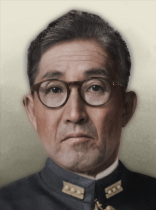
- The Remnant: If the Japanese colonial government loses control over Malaya, Kurosawa will rally the remnant Japanese forces and retreat to Singapore. Luckily for them, the UMAJF can't attack them there because Singapore is too important for Japan to lose and any invasion there would threaten more heavy Japanese intervention that the rebels have no chance of winning against.
Burhanuddin Al-Helmy

- Dark Horse Victory: Given his socialist beliefs, few would've expected that Burhanuddin can win the Malayan elections after the collaborators win the Malayan Emergency.
- Internal Reformist: Burhanuddin's platform is based on delivering a mix of socialist and Islamic reforms to fix the collaborationist government's worst flaws.
- Teeth-Clenched Teamwork: Though a Japanese collaborator, Burhanuddin is disliked by Japan as too radical for his own good. His anti-colonialist rhetoric might stand opposed to Japanese influence in Malaya and his amiable attitude towards Sukarno in Indonesia might empower the latter's regime too much and upset the balance of power in the Sphere.
Dato Onn Jaafar
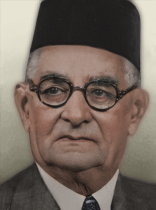
- Necessarily Evil: Onn doesn't enjoy working for Japan and earnestly wants a free Malaya, but he stands opposed to the UMAJF because he believes liberation can only come from negotiating a decolonization with Japan.
- Puppet King: His willingness to work with Japan makes him the perfect figurehead for them to exert their control over Malaya.
- The Quisling: Onn is content to keep Malaya under Japan's thumb, which is his campaign receives significant Japanese support during the Malayan elections.
- Won the War, Lost the Peace: After the Malayan Emergency and elections, Onn will have to contend with his growing age and the increasing fractures within his own party, which will significantly hamper his ability to govern the nation.
Syed Jaafar Albar
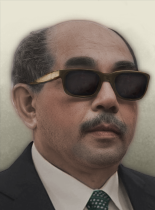
- The Friend Nobody Likes: Most of the Japanese establishment dislikes Syed Jaafar because is a Malayan nationalist who might commit ethnic violence and make the Sphere's unequal nature all the more obvious. He only ends up ascending to the premiership when either Jaafar passes away or when a ceasefire is called, where no other worthy leader can take power because Burhanuddin was murdered by partisans.
- Meet the New Boss: Whether he succeeds Onn upon his passing or just blatantly seizes power himself, Syed Jaafar has the same foreign agenda in mind: continued collaboration with the Japanese.
- Patriotic Fervor: Syed Jaafar can rise to power in the collaborationist government by espousing nationalist views that win him the support of native Malayans, at the potential cost of starting ethnic violence against the country's minorities.
- The Quisling: Syed Jaafar is eager to collaborate with the Japanese, even if it means subjecting his own people to another round of colonial oppression. On the other end, Japan dislikes his overt nationalism, but will accept him as Prime Minister because he can be useful counterbalance to the growing Thai influence in Southeast Asia.
Ismail bin Ibrahim

- The Quisling: Ismail is a Malaysian soldier serving under the Japanese collaborationist government and will be appointed as its leader if the Malayan Emergency ends in a ceasefire.
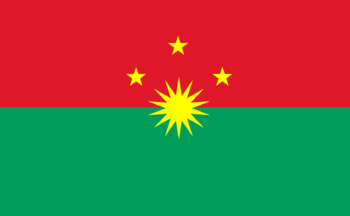
- Apathetic Citizens: If the CIA begins to meddle with Malaysian elections, it will soon find that most Malaysians are largely politically illiterate and that campaigning with banners and posters are ineffective. Other tactics seem to work better.
- Chummy Commies: The UMAJF is a communist united front dedicated to freeing Malaysia from Japanese imperialism by any means necessary, including cooperating with the OFN.
- Commonality Connection: An American representative and UMAJF general empathize with each other when they discuss all they've lost to the Japanese, with the former losing his family when Hawaii was occupied, while the latter lost his son when Japanese soldiers shot him in cold blood.
- Deal with the Devil: Should the UMAJF take a port, the OFN is more than willing to flood them with guns, advisors and supplies. While their neighbors may sneer at them for receiving assistance from the west, at least they will be free and very well-armed.
- The Determinator: The UMAJF starts at a disadvantageous position to Shonan, but all of their fighters are still determined to fight for their cause, casually disregarding the possibility of death.
- Easy Logistics: Subverted. The American aid to the UMAJF is hindered by a lack of ports to send them substantial help, which makes it incredibly vital for the rebels to acquire one if they want to win.
- Enemy Mine: The UMAJF is an alliance between four different groups: the Communist Party of Malaya (PKM) led by Chin Peng, the socialists under Ahmad Boestamam, the nationalist PEKEMBAR under Tun Abdul Razak, and the Askar Wataniah Regiment under pro-nationalist General Yeop Mahidin.
- Hidden in Plain Sight: A CIA agent and Malay contact discuss sending financial aid to Razak's election campaign, disguising themselves as fishermen talking about partitioning their share. Since this is a common sight, the conversation goes unheard by bystanders.
- I Did What I Had to Do: Many deride the UMAJF's outreach for generous American support, but the group justifies their actions as necessary to liberate Shonan.
- We ARE Struggling Together: If the Malayan Emergency lasts too long and the UMAJF fails to gain enough territory, the MPAJA and Askar Wataniah will break ranks and put the conflict to a screeching halt.
Chin Peng
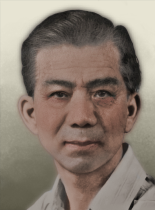
- Chummy Commies: Peng is a Malaysian Chinese communist fighting for the liberation of his home country against Japanese imperialism.
- Cincinnatus: If the UMAJF triumphs in the Malayan Emergency, Peng plans on acting as a caretaker governor, until new elections are held and a president is formally chosen. However, this becomes Subverted if the UMAJF achieve ceasefire in favor of the collaborators, in which he adopts emergency powers and is unlikely to step down in the near future.
- The Determinator: Peng will stop at nothing to liberate Malaya from both the Japanese and Americans. Even if a Japanese-leaning ceasefire occurs, Peng will never stop fighting from the jungles, awaiting a chance to strike again.
- Occupiers Out of Our Country: Peng is not only opposed to the Japanese occupation, but also to the possibility of the United States staying in Malaysia and replacing the Japanese, once the Malayan Emergency is over. If the UMAJF wins and Peng stays in power, he will cut ties with the OFN and pursue an independent foreign policy.
- Old Soldier: Peng has been fighting the Japanese for over 20 years.
- Well-Intentioned Extremist: If the Malayan Emergency ends in a Japanese-leaning ceasefire, Peng will need to adopt emergency powers to stop a coup attempt by Askar Wataniah and hold off further Japanese attacks, becoming a dictator in the process.The light of democracy fades away.
- Who Needs Enemies?: He is only allied with the OFN so long as Japan continues to occupy Malaya. If he remains in control of the country after the conflict ends, he ceases all continued diplomatic ties with the United States.
Ahmad Boestamam

- Choosing Neutrality: Boestamam can only be called an American ally during the Malayan Emergency, where the rest of the UMAJF relies on OFN aid to expel the Japanese. Once the conflict is over, Boestamam will cut ties with the OFN, which would be an unfavorable outcome for the United States.
- Chummy Commies: Besides being a socialist, Boestamam is dedicated to rebuilding Malaysia after its devastating civil war.
- Graceful Loser: If Razak wins the election, Boestamam will feel frustrated about the people rejecting his rhetoric, but he doesn't hold if personally against his opponent and only implores him to not let the Americans garner too much power and turn Malaya into another puppet state.
- Reasonable Authority Figure: He recognizes that not many are keen on accepting his socialist ideas, leading him to ally with more moderate elements in the UMAJF to keep the coalition together.
- Won the War, Lost the Peace: Upon taking power via election, a large nationalist movement rises up in opposition to him, indicating that his efforts to reform Malaya will not be easier than liberating it from Japan.
Tun Abdul Razak
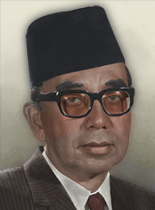
- Allohistorical Allusion: He can become Prime Minister of Malaysia just like OTL, albeit a decade early.
- Every Man Has His Price: The CIA can utilize its lavish budget to bribe Malaysian politicians and political campaigners to smoothen Razak's way to victory.The drug called payola is quite effective
- Voluntary Vassal: Razak is friendlier to OFN interests than Boestamam and will turn Malaya into an OFN observer, if he gets elected.
- Won the War, Lost the Peace: Even if Razak secures election after the Malayan Emergency, a strong socialist coalition, led by Boestamam, stands opposed to his agenda, casting doubt on if the new president can push his agenda without tearing the nation apart.
- Worthy Opponent: Even after Razak beats Ahmad Boestaman in the Malaysian elections handily with sufficient CIA support, when the latter voices his frustration and accuses the former of being in the pocket of the CIA, Razak takes the time to listen to and empathize with his defeated foe, befriending him in the process.
Yeop Mahidin

- Cincinnatus: Once he seizes power, Mahidin institutes a temporary military junta, promising to eventually step down when Tun Hussein Onn arrives back from exile in India. Many cast doubt on the authenticity of his promise, but Mahidin can actually live up to it and let Hussein take over.
- The Coup: In the case of a Shonan-leaning victory scenario in the Malayan Emergency, Mahidin and the Askar Wataniah can coup Peng's MPAJA, establishing a temporary dictatorship until the return of Hussein.
- Paper Tiger: Though the Askar Wataniah regime is outwardly popular, it is still quite fragile, especially as the Malaysian communists still exert considerable influence in the countryside and Japan awaits an opportunity to further destabilize a potential American ally next to them.
- Voluntary Vassal: Sympathetic to the OFN, Mahidin begs for financial aid from them to prop up his regime in the war-torn peninsula, including a request for $1.5 billion per annum.
Tun Hussein Onn
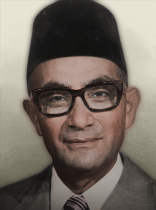
- The Exile: Since the Japanese conquest of Malaya, Hussein has lived in exile in the Republic of India, though he can return if Mahidin takes over the UMAJF remnants and steps down from power.
- Odd Friendship: Hussein is surprisingly good friends with LeMay from the United States, with the latter promising that the NPP will send more aid to Malaya and defending him from a racist who confronts the two.
- Reasonable Authority Figure: Hussein is willing to compromise with the collaborationist government and reunite bloodlessly to end their feud. Even better, this approach can work, as the UMAJF remnants can peacefully unite Malaya, with the exception of Shonan-to.
North Borneo

- Balkanize Me: In Takagi's route, the Nanpo Gunseikan will be balkanized into three states: itself, Sarawak, and Brunei.
- Bilingual Bonus: The kanji on the Nanpo Gunseikan's flag translates to "Inspectorate General of Southern Military Government"; it is a truncated version of "Inspectorate General of Military Government, Southern Army
 " (Japanese: 南方軍軍政総監部), the military occupation administration of the IJA Southern Expeditionary Army Group
" (Japanese: 南方軍軍政総監部), the military occupation administration of the IJA Southern Expeditionary Army Group .
. - Day of the Jackboot: the North Borneo Administration is where the IJA's presence in Southeast Asia is most directly felt, with the military garrison having near-absolute control, and a blank check to do whatever it wants away from Tokyo's prying eyes.
- Know When to Fold 'Em: Should Takagi become Prime Minister and order an investigation into the North Borneo Administration, he can have the IJA garrison withdraw, rationalizing that it’s causing more trouble than it’s worth. The territory is instead handed to a transitional authority tasked with overseeing its partition.
- Minor Crime Reveals Major Plot: An investigation of North Borneo under Prime Minister Takagi reveals a web of corruption and brutality that shocks the Japanese government into dissolving it.
- Wretched Hive: While North Borneo on paper is strictly run by the IJA garrison, in practice it's rife with myriad abuses and exploitation. So much so that should these come to light under Prime Minister Takagi's investigation, he has the territory dissolved and partitioned almost immediately.
Baba Masao
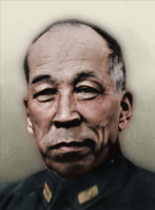
- Evil Colonialist: Baba Masao is a tyrant who does not shy away from any brutal methods to suppress any attempts at resistance and enforce his will. A believer in Japanese supremacy, he furthered Japanese assimilation policies in North Borneo and turned it into a playground for Japanese zaibatsu, each seeking for their share of riches from the island.
- False Reassurance: Masao is on the receiving end of this from Takagi upon being ordered back to Japan. While he's ostensibly being given a hero's welcome and commendation, he breaks down upon realizing that this is only a pretext to his imminent trial in light of the government's investigation into Borneo.
- Villainous Breakdown: In Takagi's Conservative path, Masao loses it upon being recalled back to Japan. Despite ostensibly receiving a hero's welcome, he knows that his days are numbered once the truth comes to light.
Sugiyama Shigeru
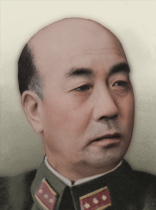
- Boring, but Practical: Sugiyama's control of North Borneo is far more limited than Masao's, but this means that Japan doesn't waste as much money on maintaining their tight occupation of North Borneo, delegating that job to the native collaborators and giving leeway for how Japan can spend their funds.
- Cincinnatus: Sugiyama is tasked to oversee the transition of power to local collaborators, with the bulk of the garrison being withdrawn once this is accomplished.

- Bilingual Bonus: There are two lines of Arabic text on their text, reading "Always in service with God's guidance" and "Brunei, the Abode of Peace", reflecting the Islamic influence in the country.
- The Good Kingdom: The restoration of the monarchy in Brunei is portrayed as a positive consequence of Takagi's reforms and a restoration of autonomy back to the natives.
Omar Ali Saifuddien III

- Rightful King Returns: After the Nanpo Gunseikan is dismantled, Saifuddien will be invited back to power as the Sultan of Brunei, restoring independence back to the country.

- La Résistance: With help from the OFN, the people of Sarawak have bitterly resisted the Japanese occupation of their homeland, in which they may get their semi-independence when Takagi dismantles the Nanpo Gunseikan and releases them as a Japanese aligned state
Abang Haji Mustapha
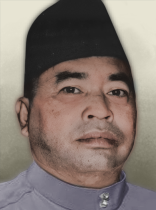
- The Quisling: Mustapha has collaborated with the Japanese ever since their occupation of Sarawak in World War II, in which he can then take charge of the country if Takagi dissolves the Nanpo Gunseikan.

